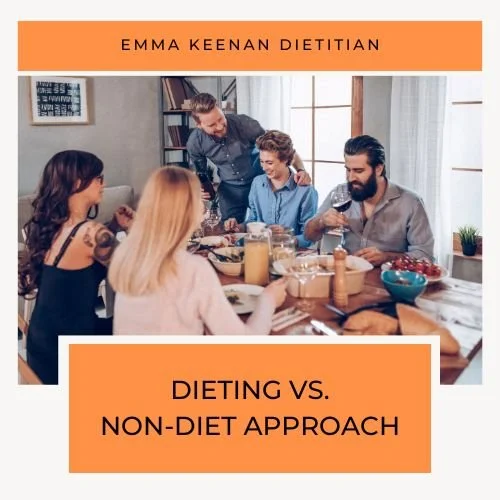Dieting vs. Non-Diet Approach
If you’re new to the Non-Diet Approach or if most of your nutrition education has come through dieting, it’s completely understandable to assume it means “just eating whatever you want” without regard for your health. This is a common reaction, especially because many of the principles of the Non-Diet Approach directly challenge diet culture. But what if giving yourself permission to nourish your body without rigid rules is actually what creates the freedom to engage in truly health-promoting behaviours?
Unfortunately, we’ve been marketed the idea that being in a higher weight body equals poorer health, and the key to better health is simply to “just lose weight”, achieved by “eating less and exercising more”. All of this is incorrect. So, it’s easy to see why the idea of not focusing on weight loss or restricting your energy intake might seem counterproductive at first.
The reality is that body diversity is a natural part of being human, people come in all shapes, colours and sizes. Just as individuals can be shorter or taller and have lighter or darker skin tones and hair colours, it’s completely normal for people to fall across a spectrum of body weights, from lower to higher. And just as we wouldn’t assume that a taller person is less healthy and a shorter person is healthier based on appearance, we also can’t assume that someone in a higher-weight body is less healthy, or someone in a lower-weight body is healthier, simply by looking at them.
Overall, scientific evidence shows that although dieting may result in short-term weight loss, it almost always leads to regaining the lost weight, often with additional weight gain. Importantly, research demonstrates that an individual’s weight does not solely determine their health status and losing weight doesn’t solely improve health outcomes. Instead, regardless of BMI, long-term health is more strongly influenced by behaviours such as eating plenty of fruits and vegetables, engaging in regular physical activity, consuming alcohol in moderation, and avoiding smoking. These health-related behaviours reduce the risk of premature death regardless of BMI. In fact, as we age, having a BMI in the “overwe*ght” category is actually associated with a lower risk of dying early.
Most importantly, it’s well established that experiencing weight stigma can negatively impact mental health, contributing to anxiety, depression, low self-esteem, and body dissatisfaction. It is also strongly associated with the following health issues including high blood pressure, elevated blood sugar and cortisol levels, increased inflammatory markers, various forms of arthritis, chronic pain, infertility, dismissed health concerns, and eating disorders.
Dieting Vs. Non-Diet Comparison
Let’s take a closer look at how dieting compares to the non-diet approach.
Dieting, at its core, is designed for you to fail and then blames you when it doesn’t work, keeping you trapped in the diet cycle.
Dieting |
Non-Diet Approach |
|---|---|
| Inflexible, rigid rules, and restriction | Flexible, intuitive, aware and varied |
| Quantitative focus (calories, macros, numbers) | Qualitative focus (how food feels, tastes, satisfies) |
| Promotes disordered eating behaviours | Promotes normalised eating patterns and behaviours |
| A strong predictor for developing an eating disorder | Protective against developing an eating disorder |
| Focused on weight loss | Focused on health and overall wellbeing |
| Removes certain foods or food groups; labels foods as ‘good’ or ‘bad’ | Includes all foods and food groups; food is not moral |
| Leads to body dissatisfaction | Supports body neutrality and acceptance |
| Ignores hunger and fullness cues | Responds to hunger and fullness cues |
| Increases food noise and becomes thought-consuming | Quietens food noise and frees up mental space |
| Creates a false sense of control | Builds trust in your body |
| Feels like food imprisonment | Supports food freedom |
| Time-based eating (e.g., “only eating at certain times”) | Encourages life balance |
| Prescriptive or compulsory exercise | Emphasises finding enjoyable movement |
| Rooted in deprivation and temptation | Leads to satisfaction and calm |
| Feels punishing and like a constant struggle | Kind, supportive, and enjoyable |
| Anti-social, shaming, guilt-inducing | Social, appreciative, and forgiving |
| Driven by fear-driven, rationalisation, and suppressed hunger | Fosters freedom, confidence, and comfort |
With the non-diet approach, you can enjoy pizza with your friends, without guilt, rule-breaking, or feeling like you’ve done something wrong. Best of all, you don’t have to throw your diet out the window and start over on Monday. When weight isn’t the focus, eating for health becomes much more sustainable and enjoyable.
BENEFITS OF THE NON-DIET APPROACH
Dietary Patterns
Improved overall diet quality
Greater dietary adequacy and variety
Increased intake of fruits and vegetables
Reduced consumption of sugar-sweetened beverages
Higher fibre intake
Decreased motivation to eat "unhealthy" foods for reasons unrelated to hunger
Mental Health and Wellbeing Outcomes
Reduced disordered eating behaviours and lower risk of eating disorders
Less engagement in dieting and weight control strategies such as fasting or skipping meals
Fewer episodes of binge eating
Lower levels of depressive symptoms, stress, and anxiety
Health Measures
Lower total and LDL (‘bad’) cholesterol
Reduced triglyceride levels
Increased HDL (‘good’) cholesterol
Body Image
Improved overall body image
Greater acceptance of body image
Increased body appreciation and satisfaction
Heightened body awareness
Reduced concerns about body shape and weight
Less dissatisfaction with body image and self-perception
Decreased body image discrepancy
Fewer experiences of weight-related guilt and shame
Greater sense of body and weight acceptance
Wellbeing
Higher levels of mindfulness and self-compassion
Greater self-esteem and mental wellbeing
Lower levels of internalised weight bias
Increased overall life satisfaction
Physical Activity
Greater engagement in physical activity
Increased enjoyment during movement
Less focus on appearance as motivation
Reduced influence of external pressures, guilt, or shame
Other Health-Promoting Behaviours
Adoption of a more health-oriented lifestyle
Smaller portions of energy-dense foods
Greater enjoyment and pleasure from eating
Less emphasis on calorie or fat content when choosing foods
Improved sleep patterns and better sleep quality
Working With a Non-Diet Dietitian
Emma can support you to:
Explore your dieting history and your relationship with food and your body
Discover the weight range where your body feels comfortable and healthy
Build a more balanced, positive relationship with food
End the cycle of undereating and overeating
Challenge food rules, nutrition myths, and influencer misinformation
Reconnect with your body’s natural signals of hunger, fullness, and satisfaction
Create satisfying meals and snacks that support your body’s physiology
Unlearn dieting and disordered eating patterns, and relearn flexible, normal eating habits
Explore options for finding movement that feels enjoyable and sustainable
References
Eaton. M., Probst, Y., Foster, T., Messore, J., & Robinson, L. (2024). A systematic review of observational studies exploring the relationship between health and non-weight-centric eating behaviours. Science Direct. 199, 107361.
Gaesser, G. A., & Angadi, S. S. (2021). Obesity treatment: Weight loss versus increasing fitness and physical activity for reducing health risks. iScience, 24(10), 102995.
Tomiyama, A. J., Ahlstrom, B., & Mann, T. (2013). Long-term Effects of Dieting: Is Weight Loss Related to Health? Social and Personality Psychology Compass. 7(12), 861-877.
Tomiyama, A. J., Carr, D., Granberg, E. M., Major, B., Robinson, E., Sutin, A. R., & Brewis, A. (2018). How and why weight stigma drives the obesity ‘epidemic’ and harms health. BMC Medicine, 12(123).
Weeldreyer, N. R., Guzman, J. C. D., Paterson, C., Allen, J. D., Gaesser, G. A., & Angadi, S. S. (2024). Cardiorespiratory fitness, body mass index, and mortality: a systematic review and meta-analysis. British Journal of Sports Medicine. 59, 339-346.





